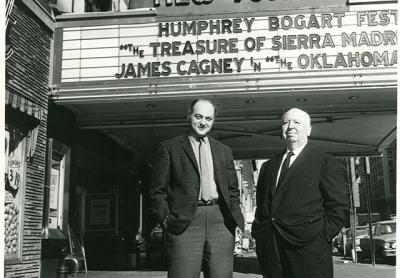Daniel Talbot, Writer and Film Entrepreneur

Daniel Talbot, who with his wife and partner, Toby Talbot, introduced New Yorkers for 60 years to contemporary cinema from around the world and revived classic American films at a number of theaters in Manhattan including Lincoln Plaza Cinemas, died at his Manhattan home on Dec. 29. Mr. Talbot, who had a house in Water Mill, was 91. He had been ill for the last few months.
In a profile in this newspaper in 1998, Mr. Talbot said film had always been an interest, that becoming the owner of movie houses and a film distributer and critic could be said to have been inevitable. He saw upward of 350 films a year, he said, more than many see in a lifetime.
He owned the Cinema Studio at Lincoln Center, which he started and which lasted through the 1980s overlapping with the Lincoln Plaza Cinemas, which is scheduled to close at the end of the month.
He and his wife, Toby Talbot, a translator, teacher of documentary film, and writer, met while walking on Southern Boulevard in the Bronx in 1950. They were soon married.
He worked in publishing in the 1950s, compiling anthologies of short stories, when he decided to collect essays by serious film writers from the 1920s for publication, which prompted an interest in film criticism. He was the film critic for Progressive magazine, a job that lasted a year. He and his wife, however, went to movies once or twice a week, to the Little Carnegie, the Normandy, and the Beverly, which specialized in English movies.
Then an opportunity arose for him to buy the New Yorker theater, formerly the Yorktown, on 88th Street and Broadway. The couple showed notable American films from the 1930s and ’40s there, selling it in about 1973 and then running the Metro theater for about five years, showcasing second-run movies.
In the 1960s Mr. Talbot began buying the rights to movies, which were subsequently produced and made available to American audiences, among them Bernardo Bertolucci’s 1964 film “Before the Revolution.” His personal library of more than 200 films was called New Yorker Films, and he eventually donated copies of the whole collection to Jersualem Cinematheque.
Among the first films he introduced in New York City was “Point of Order,” 188 hours of the 1954 Senate hearings on Joseph McCarthy that he and Emile De Antonio edited to 97 minutes. He also showed “Shoah,” Claude Lanzmann’s nine and a half hour interview-based documentary about the Holocaust, and Leni Riefenstahl’s propaganda documentary about the 1934 Nazi Party Congress, which he released in 1960.
His daughter Nina Talbot of Brooklyn said her father kept a journal for most of his life and was always writing. Cynthia Rowell, an assistant editor at Cineaste, called his writing “original, compelling, perceptive, cultivated, forthright, steadfast, passionate — all of which could be used to describe the films he selected.”
He was born in the Bronx on July 21, 1926, the only child of Israel Distenfeld and the former Jean Frances Charak. He graduated from Evander Childs High School in the Bronx and attended City College of New York on the G.I. Bill after serving in the Army during World War II. He had trained with a combat unit in Georgia and then secured an administrative job at the Pentagon, where he was charged with finding out and letting officials know where any general was located.
His daughter said that even though she had known of his wartime service, it was not until the last six months that he indicated how upset he had been when he learned that the whole unit he trained with had been killed at the Battle of Leyte Gulf in the Philippines.
Mr. Talbot is survived by his wife and three daughters. In addition to Nina Talbot, they are Emily Talbot of Manhattan and Sarah Tanzer of Brooklyn. He also is survived by four grandchildren.
A funeral service was held on Dec. 31 at Riverside Memorial Chapel in Manhattan, with Rabbi Mark Rand officiating. Mr. Talbot, who told The Star that he came out to Water Mill to watch the birds and see old friends, was buried at the Water Mill Cemetery.
